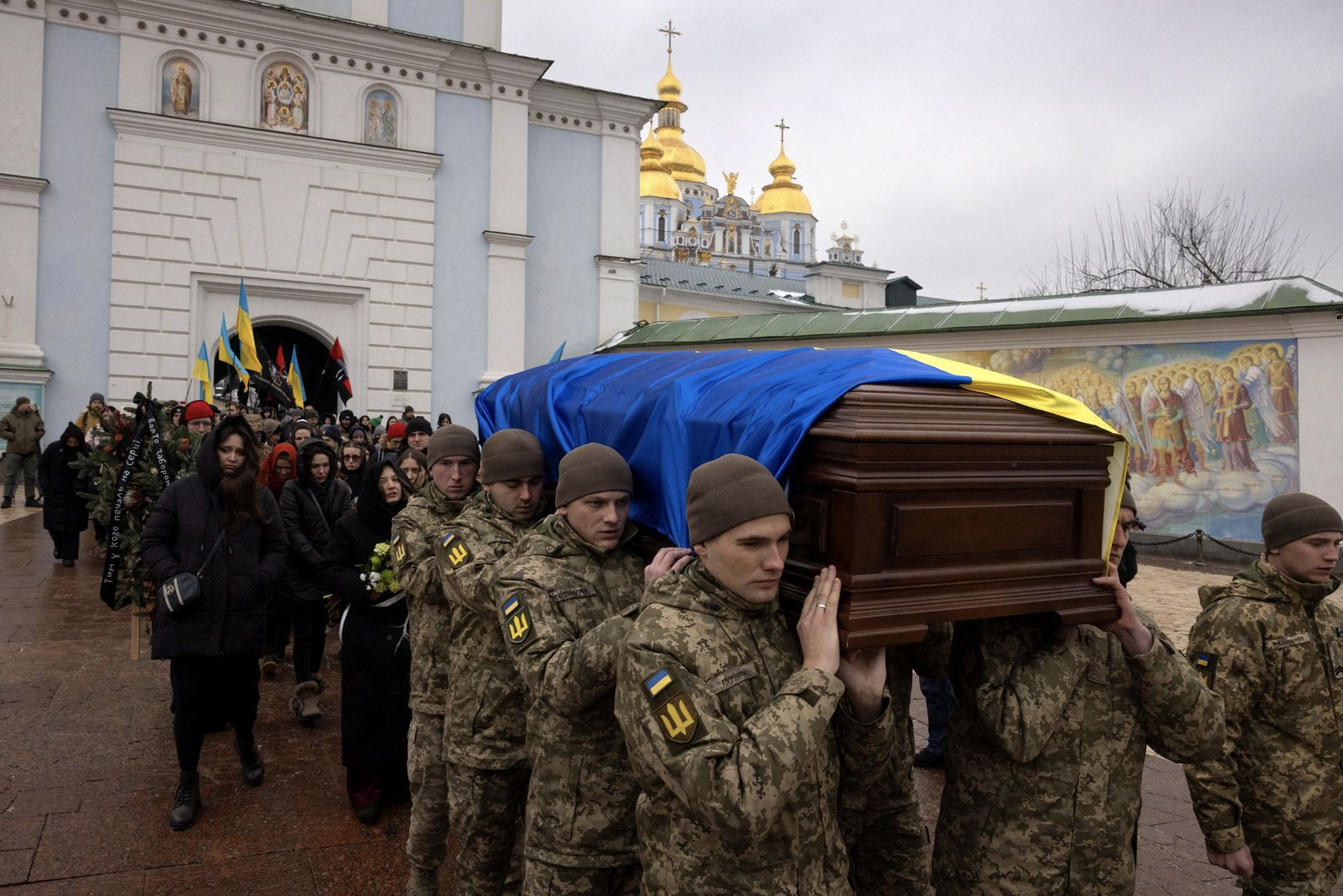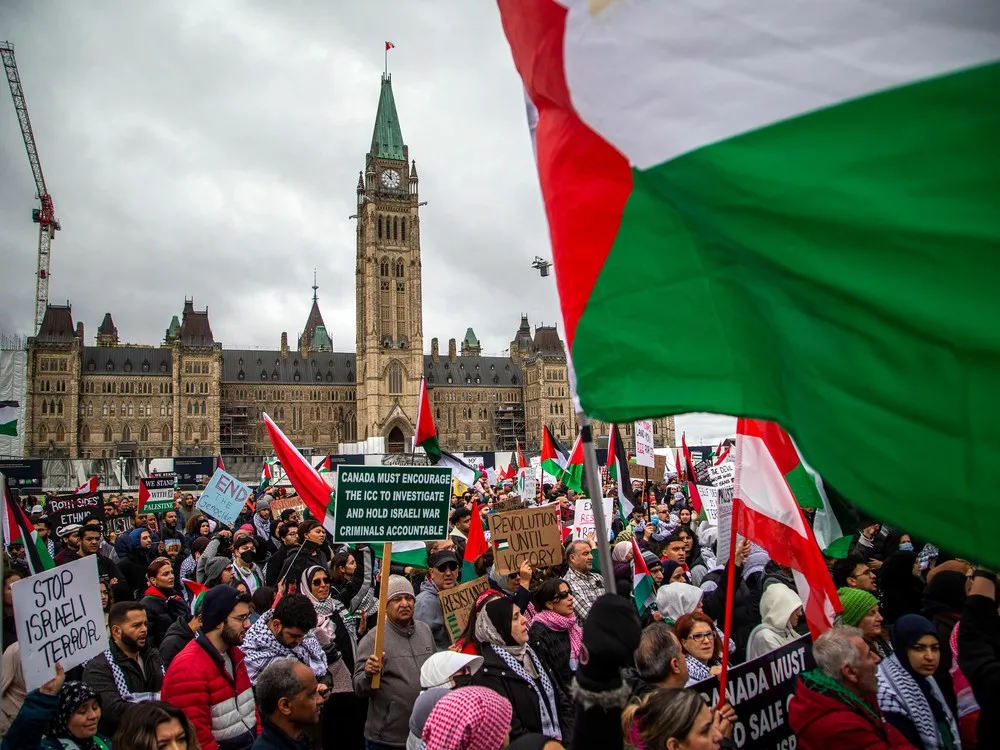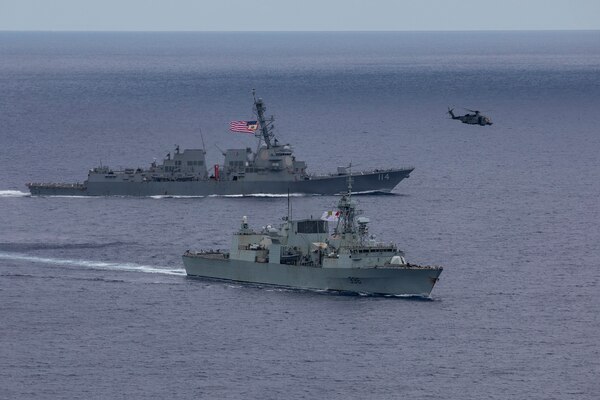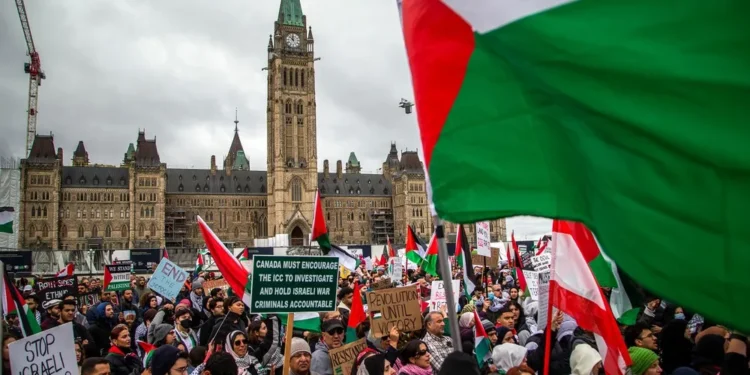A diplomatic response to MaduroтАЩs victory would entail recognizing the electionтАЩs result and pledging to work with Caracas to rebuild economically and expand human rights following nearly a decade of U.S.-led and Canadian-backed hybrid warfare. Instead, Canada continues working with the U.S. to crush the Bolivarian Revolution, WashingtonтАЩs leading target in the hemisphere since Hugo Ch├бvezтАЩs first election victory in 1999. This policy can only bring more destabilization to the region.
According to Maria Paez Victor, a Venezuelan activist living in Canada, тАЬThe democratic tragedy of Canada is that Canadians know next to nothing what their Ministry of Foreign Affairs does in their nameтАж Most donтАЩt have any idea of the increasingly soiled reputation of Canada in the world today.тАЭ
Fuelling the war in Ukraine
Almost three years after RussiaтАЩs invasion of Ukraine, the war rages on, with hundreds of thousands of casualties and millions still displaced. Opportunities for peace have been scattered to the winds as pro-war politicians in the West continue dumping arms into the warzone, Canada included. In fact, OttawaтАЩs war policy has been particularly aggressive. On September 13, for example, Trudeau stated that Canada would support Ukrainian strikes deep inside Russian territory, an action that would threaten to draw Canada and NATO into direct war with Moscow.
In response to manpower shortages, the Ukrainian government lowered the draft age from 27 to 25 in May 2024, opening a new segment of their youth to death in the Eastern meat grinder.
Canada should be fostering peace in Europe, but every policy decision and public statement seems geared toward prolonging war, even as the battlefield situation looks increasingly dismal for Ukraine.┬а
The Russia-Ukraine war has long been a conflict fought by the poor, but since early 2024 Ukraine has become a pressure cooker of class conflict.┬а
In response to the disastrous 2023 counteroffensive, the Ukrainian government turned even more sharply towards neoliberalism: the state drastically reduced social spending, imposed greater taxes on small and medium-sized businesses, and implemented draconian measures to force Ukrainians to the battlefront, including press gangs to forcibly mobilize citizens. Life expectancy, birth rates, and trust in government have plummeted while poverty has risen and social divisions have inflamed.
тАЬForced mobilisation [in Ukraine], the reduction of the rights and freedoms of the population, further economic disruption and social hardship contrast sharply with what is widely perceived as the corruption-fuelled lifestyle of an entrenched and unaccountable elite,тАЭ write professors Stefan Wolff and Tetyana Malyarenko.┬а
 Three years into RussiaтАЩs invasion in Ukraine, hundreds of thousands of Ukrainians have died and many others displaced, with no end in sight. Photo via 9News
Three years into RussiaтАЩs invasion in Ukraine, hundreds of thousands of Ukrainians have died and many others displaced, with no end in sight. Photo via 9News
Since then, things have only gotten worse. The average age of Ukrainian soldiers on the frontline is 43 to 45, an indication of just how many young Ukrainians have lost their lives or fled since the Russian invasion of February 2022.
In response to manpower shortages, the Ukrainian government lowered the draft age from 27 to 25 in May 2024, opening a new segment of their youth to death in the Eastern meat grinder. The new mobilization law also creates a digital database of Ukrainian men of military age, which will тАЬenable the army to better identify the countryтАЩs human resources,тАЭ according to FranceтАЩs Le Monde.┬а
Put differently, it will help the army identify men who will be press ganged into an exhausted war effort.
In such a grim situation, a sober, realistic perspective is needed in the Western leadership. Such a perspective does not exist, and Canada has shown unwillingness or inability to fill the void.┬а
Instead, Ottawa has continued its warmongering, which only means more dead Ukrainians, more dead Russians, European economies in shambles, and no clear endgame for the West.
Arming genocide, world opinion be damned
Despite global outrage over IsraelтАЩs slaughter of Palestinians and invasion of Lebanon, Canada continues arming the Israeli war machine. It doesnтАЩt seem to matter that Israeli President Benjamin Netanyahu and Defence Minister Yoav Gallant are wanted by the International Criminal Court (ICC), just like OttawaтАЩs enemy number one, Vladimir Putin.┬а
Still, Canada continues to support Tel AvivтАЩs vicious bombardment against Palestinians and the current expansion into Lebanon, which has seen Israel kill thousands of Lebanese and displace 1.2 million people.
Ottawa endorsed IsraelтАЩs assassination of Hezbollah leader Hassan Nasrallah, which saw Israel bomb a densely populated area and kill at least 33 civilians in order to reach Nasrallah. At the same time, Ottawa condemns Iranian missile strikes in Israel that kill few to no civilians.
Rather than bringing him before a court of justice, Canada and other Western countries celebrated NasrallahтАЩs extrajudicial assassination тАЬsuggesting that Western governments have grown increasingly comfortable with the use of targeted killings, to the point that a brazen, acknowledged assassination failed to trigger meaningful condemnation.тАЭ
IsraelтАЩs backers did not even attempt to fabricate a legal justification for the assassination. Instead, тАЬlegitimising efforts by Israel and the U.S. have been so successful in normalising assassination that, even when they acknowledge assassinations, they rarely engage in legal justifications anymore. Instead they simply talk of тАШjustice.тАЩтАЭ┬а
Rather than bringing him before a court of justice, Canada and other Western countries celebrated NasrallahтАЩs extrajudicial assassination.
While Canada praises IDF political assassinations, the Israeli military has also killed Canadian citizens with impunity.┬а
Israeli troops have attacked UN forces without losing Canadian support. They have targeted journalists, medical staff, children тАФ and still Canada backs IsraelтАЩs war effort through diplomatic support, direct arms transfers, and the repression of domestic dissent, including police attacks on Palestinian solidarity protests.┬а
Defence Minister Bill Blair has even vowed to support a direct Israeli strike on Iran.
CanadaтАЩs committed backing of IsraelтАЩs bombardment has also not gone unnoticed globally.┬а
In February, the government of Nicaragua announced that it was taking Canada to the ICJ for contributing to the genocide of Palestinians by supplying arms to Israel. The next month, the Liberal government announced plans to тАЬcease the further authorization and transfer of arms exports to Israel.тАЭ However, pre-authorized Canadian arms continued to flow to Israel, despite Blair lying about this fact when confronted by activists on August 7.
The Canadian government, a supposed champion of human rights and the тАЬrules-based international order,тАЭ is lying to its citizens and repressing domestic protest in order to continue arming an increasingly far-right government that has continued to expand its illegal settlements.┬а
 Since October 7, 2023, Canadians have been demonstrating in cities and towns across the country, calling for the federal government to demand a ceasefire and to stop arming and funding the Israel. However, that would mean breaking from the official policy of the U.S.
Since October 7, 2023, Canadians have been demonstrating in cities and towns across the country, calling for the federal government to demand a ceasefire and to stop arming and funding the Israel. However, that would mean breaking from the official policy of the U.S.
Whose interests does this Canadian policy serve? Not Canadians, not the people of the Middle East whose lives are being destabilized or destroyed by IsraelтАЩs devastating rampage, and certainly not the rest of the world.┬а
But it does serve the interests of the U.S. and Israel.
Brett McGurk, BidenтАЩs top Middle East official, has outlined WashingtonтАЩs harrowing plan for the region should Israel complete its ethnic cleansing of Palestine.┬а
As The Nation contributor A├нda Ch├бvez explains, тАЬMcGurkтАЩs idea is to have Saudi Arabia and the other wealthy Gulf countries build on the rubble of Gaza, and then have Biden travel to the region for тАШa victory tour,тАЩ where he claims credit for the Israel-Saudi deal as the solution to decades of implacable crisis in the Middle East.тАЭ
What will follow the destruction of the Palestinian resistance? U.S. targeting of Iran and the wider Axis of Resistance, followed by an even more aggressive pivot to China. Ch├бvez writes: тАЬWith Hamas out of the picture and a demilitarized Palestinian state under the influence of the Gulf regimes, the thinking goes, the U.S. will have Arab cover in the region to be able to counter IranтАж and then put all of its energy toward a confrontation with China.тАЭ
The U.S.-Canadian war on China
CanadaтАЩs тАЬAmerica FirstтАЭ foreign policy has seen Ottawa take an increasingly hostile stance toward China, including by sailing warships off the Chinese coast and adopting an тАЬIndo-Pacific StrategyтАЭ that is in-effect a carbon copy of WashingtonтАЩs. Most recently, Canadian authorities again followed the U.S. lead by imposing a 100-percent tariff on Chinese electric vehicles, prompting The Hill Times to write, тАЬCanada sends message that we are part of тАШAmerica First.тАЩтАЭ
At the same time, Ottawa is funding and accelerating mining and mineral exploitation in Canada and across the Global South through the Critical Minerals Strategy (CMS) in the hopes of reducing imports from China.┬а
 The U.S. Navy and the Royal Canadian Navy worked together this summer to conduct operations in the South China Sea. Photo via U.S. Navy Press Office
The U.S. Navy and the Royal Canadian Navy worked together this summer to conduct operations in the South China Sea. Photo via U.S. Navy Press Office
What is the end goal of OttawaтАЩs hostile actions toward China, including the deployment of Canadian military personnel to the South China Sea? It is hard not to view these acts in the context of the Biden Doctrine тАФ WashingtonтАЩs plan to pivot toward outright confrontation with China once the Axis of Resistance has been suppressed.
тАЬHas China become a major power and is it throwing its weight around in the region at times? Yes. Is publicly accusing it of being disruptive and bulking up for a military confrontation the way to deal with it? Only if youтАЩre aiming for war,тАЭ writes professors John Price and Noam Chomsky.┬а
A perennial lackey of empire
CanadaтАЩs political history has been marked by a continued lackey status toward the worldтАЩs dominant Western empires. From the nationтАЩs colonization until the end of the Second World War, Canada has served the interests of the British Empire, sending Canadian troops to South Africa to support the Crown, then to Europe in the First World War, all while targeting domestic enemies of the empire for repression, such as Irish nationalists, South Asian anti-imperialists, French Canadian nationalists, and Indigenous resistance movements.
After 1945, the British economy was ruined. Canada joined its fortunes to the emergent global superpower, the U.S. During the Cold War, Ottawa sent troops to support WashingtonтАЩs aims in Korea and supported the American war on Southeast Asia through weapons sales. At the same time, Canadian authorities collaborated with U.S. authorities to repress anyone perceived as communist.┬а
CanadaтАЩs political history has been marked by a continued lackey status toward the worldтАЩs dominant Western empires.
Then later, during the War on Terror, CanadaтАЩs lackey status continued with deepened security collaboration and Canadian participation in destructive U.S.-led wars on Afghanistan, Iraq, and Libya.
Today, this Canadian tradition continues. As U.S. hegemony wanes, Ottawa is supporting the American empire in a multifront war that aims to challenge regional and global rivals in Latin America, Europe, and Asia.┬а
The U.S. may have described TrudeauтАЩs government as тАЬAmerica First,тАЭ but Canada has always been a lackey of empire.┬а
Now, as the U.S. imperial project is fading and there is no comparable Western empire to take its place, what will Canada do? One potential answer, it seems, is the following: deny that the U.S. empire is declining, and back WashingtonтАЩs geopolitical aims, no matter how bloody or destabilizing the result ends up being.
Source link : http://www.bing.com/news/apiclick.aspx?ref=FexRss&aid=&tid=6727a5dc162245aabbcb323d080aa0dc&url=https%3A%2F%2Fricochet.media%2Finternational%2Fcanada-has-always-been-a-lackey-of-the-american-empire%2F&c=16439179915235659054&mkt=en-us
Author :
Publish date : 2024-11-03 02:54:00
Copyright for syndicated content belongs to the linked Source.












